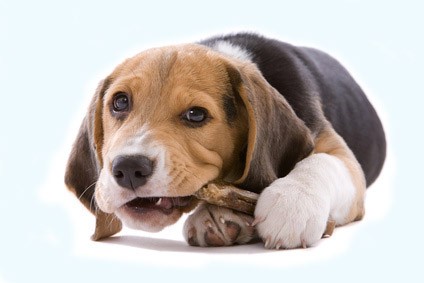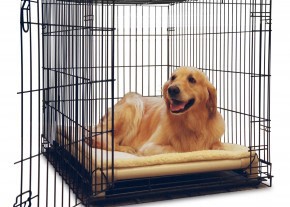Stopping Your Dog’s Destructive Behavior While You Are Away
Posted by Jenn on 01/29/2016
Inevitably, your dog will need to be left alone sometimes. (After all, someone has to buy the dog food!) Unsupervised puppies and dogs can do quite a lot of damage, especially if they are anxious, bored, or teething. You certainly hope that your dog won’t destroy the house while you’re out, but as the saying goes, hope is not a strategy. Here are some tips to help keep your dog happy – and your house in one piece! – while you can’t keep an eye on her.
Give Your Dog a Safe Zone
Having the run of the house is a big responsibility, so it should be a privilege your dog earns over time. To start with, your dog should be in a crate (if properly crate-trained) or in a dog-proofed, gated-off room while you are out. Mudrooms and laundry rooms often make great dog areas, as long as they are not too cold or too isolated. Remove any objects your dog may be tempted to chew from this area. A good defense really is the best offense! If you can’t remove a particular item, try using a bitter-tasting spray as a chewing deterrent.
Give Your Dog Something Else To Do
If possible, give your dog plenty of exercise before leaving her alone for a long period. A tired dog will nap, but a restless dog will make up her own adventures – and you won’t like them. Make sure to leave your dog with something safe and long-lasting to chew, such as a rubber Kong toy or a Nylabone. Some toys can be stuffed with food, such as peanut butter, meat, baby food, cheese, or part of your dog’s breakfast. You can make the treat last longer by freezing it first. Many dogs love frozen chicken broth!
Give Your Dog a Chew-Resistant Dog Bed
Most dog beds are just not made with dogs in mind. Too many owners have come home to find that their dog’s pillow dog bed exploded while they were out. Kuranda builds chew resistant dog beds, so you can leave the house with peace of mind. We even make beds that are specifically designed to fit in crates!
Don't Take It Personally

Chewing is an absolutely natural canine behavior, so try not to take it personally. Dogs are not resentful and vindictive like people are, and they do not chew as a way to get back at their humans. They also have no memory of past exploits, so trying to punish your dog after the fact will not work – your dog will understand that you’re angry, but that’s it. So if you do come home to find something valuable shredded, be grateful that your dog lived to tell the tale, and move on.
Note that changes to routine, separation anxiety, and even some medical conditions can cause a dog to become more destructive. If you suspect a problem, seek the advice of a vet or a qualified dog trainer.
How have you stopped your dog’s destructive behavior? Share your tips in the comments!

